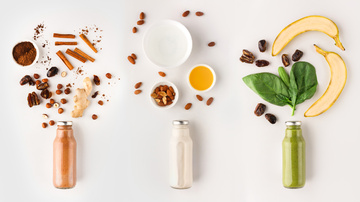5 Key Ingredients to Power-Boost your Postpartum Smoothie
 August 24, 2021
August 24, 2021 0
0
There is so much focus on the dos and don’ts of eating while pregnant. But what about after you have your baby? Nutrition is still so vital during the postpartum period. In fact, some vitamins, minerals, or macronutrients are recommended in even higher amounts than in pregnancy, especially if you are breastfeeding.
Making sure you have the proper nutrients sets you up for success, helping with milk production, recovery, mood and sleep support, healthy weight, and more. And while getting your nutrients from food first is always ideal, the reality is that most women still need extra help from supplements to meet needs. Meals can be sporadic, and it’s more likely you are reaching for foods that are quick and easy to eat one-handed while you cuddle your little one.
That’s where your postpartum smoothie comes in. A smoothie is a simple, delicious way to make it easy to meet your needs, but it’s not enough to throw a few pieces of fruit into the blender. An optimal smoothie includes all of the following:
• Protein. Protein is the foundation of nearly all the functions in your body. It helps you maintain muscle mass, keeps your blood sugar stable and is a critical nutrient for a healthy weight. Additionally, any time the body is recovering from endurance exercise or increased stress on the body (hello labor), you need more protein to support the healing process.
You also need more protein to support a healthy milk supply. Recent studies suggest that the current recommendation may not even provide enough.
Since new moms don’t always have the time or energy to make high-protein meals, adding healthy protein powders to a smoothie is an easy way for moms to get more into their diet.
• Prebiotics and probiotics. Maintaining a healthy gut is essential to your overall well-being, but it’s especially important post-pregnancy. The health of your gut is closely linked to a responsive immune system, weight management, mood and brain health, and more.
Prebiotics are the “fuel” for your gut bacteria, while probiotics help maintain the balance of healthy bacteria in your intestinal tract and improve digestion.
Mom’s gut health also influences the health of your baby - both during pregnancy and labor, as well as while breastfeeding. Studies have found that breastfed babies have higher amounts of “good” gut bacteria and even lower risks of asthma as they get older. But all of this also depends on the health of mom’s gut.
Once again, you can (and should) get your prebiotics and probiotics from food sources like high fiber veggies and fermented foods, but supplementation can ensure you get enough for you and your baby during this critical period.
• Galactagogues. Galactagogues are substances that promote lactation. These include foods like oatmeal or brewer’s yeast and also herbs or botanicals like fennel, moringa, or turmeric.
In combination with essential aspects like skin-to-skin contact and frequency of breastfeeding, adding these substances to your smoothie can help boost milk supply. They are an excellent option for moms who may be concerned that they aren’t making enough milk. And some of these herbs have the added benefit of being potent anti-inflammatories to support healthy recovery and optimal health.
• Vitamins and minerals. Your prenatal supplements provide increased amounts of certain nutrients, but some of these vitamins and minerals are needed in the same or even higher amounts if you are breastfeeding, including selenium, zinc, choline, vitamin A, vitamin D, vitamin E, and many B vitamins.
For the same reasons you took a prenatal vitamin, supplementing these nutrients during your postpartum period gives you an insurance policy. It helps you meet your needs even when you have days when most of your meals are quick bites between breastfeeding, pumping, and naps.
• Mood supporting botanicals. New moms are warned about the possibility of baby blues. Fluctuating hormones mixed with sleep deprivation can significantly influence your mood. Still, there’s really no way to prepare for the reality of how it actually feels. While “it’ll pass” may be common advice, you don’t have to grit your teeth and struggle if you are feeling down.
While postpartum depression is a serious concern and should be addressed with your medical provider, certain herbs and botanicals have been well-studied to help nurture and support you through the postpartum period, especially adaptogens.
An adaptogen helps the body respond to external or internal stressors. They support and balance the autonomic nervous system. They also help to regulate hormone levels and can be used in synergistic form with conventional medicines. Ashwagandha, one of the most commonly used adaptogens, is especially nourishing for new moms and makes an excellent add to your smoothie.
Sign up for our waitlist to be the first to learn when our Postpartum & Lactation Protein Powder launches. It includes these 5 key ingredients and more.


Comments are closed.